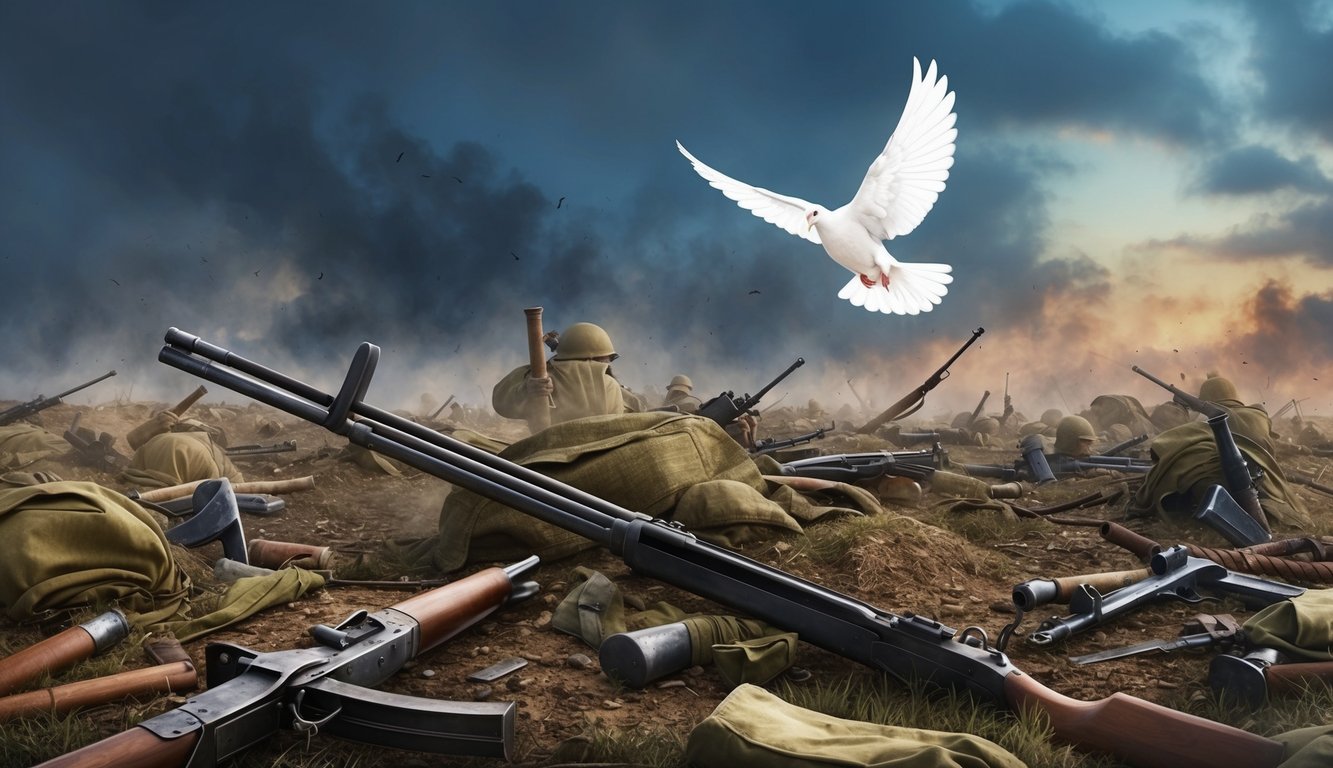Don’t Miss Out On This Unique Astrological Opportunity
Are you tired of spinning your wheels and getting nowhere? Simply put, you’re out of sync: you’re out of alignment with your astral configuration.
But: there’s a kind of map that can help you reclaim your alignment. Think of it as your own personal blueprint to success and happiness: a blueprint that will help you live your most amazing life.
Get started here.
When you look at the topics of war and peace in the Bible, you might wonder how these ancient texts relate to today’s world.
The Bible often discusses war in the context of its literary and moral teachings.
It provides insight into the complex ethics of violence.
For instance, a passage in Deuteronomy 20 talks about the rules of engagement and the drastic measures of warfare during that era.
This can be seen in an analysis of war ideologies.
You might find it intriguing how these war accounts can seem like historical narratives while also serving as moral lessons.
Some scholars explore how Biblical narratives, like the royal psalms in ancient texts, reveal deeper connections between divine authority and human conflict.
The complexities found in these discussions might offer new perspectives that resonate with you on a personal level, making the scriptures come alive in unexpected ways.
If you’re curious about the Bible’s standpoint on war, consider its ideological context too.
The Bible doesn’t just recount events; it shapes beliefs and influences society even today.
Exploring these complexities in works on war and peace in the Hebrew Bible could open up fresh ways to think about faith and its role in understanding conflict throughout history.
Biblical Perspectives on War and Peace
In the Bible, war and peace are topics that reveal much about God’s relationship with people and nations.
Various passages highlight divine guidance during conflicts and emphasize the pursuit of peace and justice as powerful moral duties.
Divine Guidance in Times of War
Throughout biblical history, war often had a spiritual dimension.
Believers looked to God for guidance and support during conflicts.
The Lord, seen as a warrior in many scriptures, provided strength and direction in battles.
In many situations, God’s guidance determined the outcome of wars, showcasing his power and judgment over nations.
Some passages depict God advising leaders on strategies and decisions.
His involvement in wars reassured believers that their struggles had divine purpose.
This view emphasizes the importance of relying on divine guidance during challenging times, ensuring that wars served God’s greater plans rather than mere human desires.
Seeking Peace and Justice
The Bible also stresses the value of peace and justice, urging believers to be active in creating harmonious relationships.
Peacemakers hold a special place in biblical teachings, often seen as acting righteously in the eyes of God.
Love, not hate, is emphasized as a guiding principle for living in peace with others.
Forgiveness is another essential aspect of maintaining peace, as it allows individuals to heal relationships and move forward without resentment.
The Bible encourages believers to practice forgiveness, and many Bible verses about forgiveness highlight the importance of letting go of past wrongs.
By embracing both peace and forgiveness, individuals can foster a more compassionate and just world.
Verses urge believers to seek justice, protect the innocent, and work towards a world where nations live without conflict.
These teachings highlight peacemakers’ roles in establishing a world that reflects God’s love and righteousness.
Fostering peace on Earth aligns with the divine vision for humanity, promoting harmony and goodwill among all people.
The Nature of Warfare and Divine Intervention

In the context of the Bible, divine intervention is a recurring theme in battles, with God’s power being central to achieving victory.
The dependence on God and His protective role as a stronghold are often highlighted in scripture.
Dependence on God for Victory
Throughout the Bible, there are numerous accounts of victory in battle being credited to the intervention of the Lord your God.
The Israelites believed that their success depended on God’s divine power and not merely on their own strength or the sword.
For example, in Judges 7, Gideon’s army triumphed over the Midianites, demonstrating how God’s hand ensured their success.
Similarly, in the story of David and Goliath, David relied on God’s strength, showing that trust in divine intervention can turn the tide in battle.
This theme is emphasized in several passages, where acknowledging God’s role in achieving victory was crucial to the faith and morale of fighters.
God as Protector and Stronghold
God is often depicted as a stronghold, shield, and fortress for those who fight in His name.
In Psalms, frequent references are made to the Lord being a refuge and deliverer in times of war and conflict.
This portrayal highlights God as a protector who provides a safe haven from enemies and offers strength during battles.
Believers relied on God as their protector and took comfort in the idea that His presence provided a powerful defense.
Verses such as Psalm 18:2 emphasize God’s role as a shield and refuge, providing peace of mind even amidst chaos.
For those seeking divine protection, these themes underscore the confidence and faith placed in God during times of struggle.
Symbols of War and Prophecy in Scripture

When you explore symbols of war in the Bible, various items like swords, spears, and chariots often appear.
These symbols carry significant meaning.
Similarly, prophetic visions often depict warfare, revealing deeper messages about conflict and divine intentions.
Swords, Spears, and Chariots
In the Bible, weapons like swords and spears symbolize both physical and spiritual battles.
A sword often represents power and justice, while a spear may signify defense or aggression.
Chariots, on the other hand, are linked with strength and speed in warfare.
The imagery of chariots can indicate the might of armies, such as in passages describing the wrath of God against nations.
Horses are also significant, symbolizing warfare and rapid movement.
They are seen as powerful and instrumental in battle strategies.
For instance, when prophets speak of peace, they mention turning swords into plowshares, which suggests transforming tools of war into instruments of peace.
Prophetic Visions of Warfare
The Bible contains vivid prophetic visions that include themes of warfare.
These visions often feature events like famines and earthquakes, seen as divine warnings or the unfolding of God’s plan.
In prophetic literature, you also encounter rumors of wars—symbolizing anticipation and fear of conflict.
These visions are not just about physical destruction but also serve a symbolic purpose, pointing to deeper spiritual struggles.
Prophets like Daniel and Isaiah often use these vivid images to convey messages about the future, calling for repentance or caution.
Prophecy in the Bible often reveals the complex interplay between human actions, divine will, and the unfolding of history.
Conduct and Ethics in War

When exploring the rules of conduct and ethics in war within the Bible, you’ll find guidance on moral behavior and faith.
Key passages outline how to approach conflict with justice and righteousness.
Rules of Engagement in the Old Testament
The Bible offers specific instructions on how to engage in warfare, particularly in the Old Testament.
One example is found in Deuteronomy 20:1-4.
This passage encourages warriors to remain courageous and to trust in God when facing enemies.
It emphasizes the assurance that God is with them as they go into battle.
War is seen not just as a physical battle but as a spiritual one.
The Bible underscores the importance of justice, urging you to act as a righteous servant of God.
Various passages ask warriors to destroy wickedness and to act as an avenger of justice, doing what is right in the eyes of the Lord.
The Role of Faith and Morality in Conflict
Faith plays a significant role in shaping how believers approach war.
You are encouraged to balance faith and morality, ensuring that actions align with God’s word.
This is highlighted when scripture refers to battles against enemies as struggles between good and evil, where God serves as judge over all actions.
Moreover, the Bible teaches about being a servant of God during times of conflict.
You are urged to uphold values of justice and morality, and to avoid unnecessary destruction.
The ethics of war also involve the idea of being righteous and maintaining one’s faith against opposing forces, embodying the principles of justice and morality throughout the conflict.
Promises of Deliverance and Redemption

In the Bible, the themes of deliverance and redemption offer believers comfort and hope.
These promises assure you of God’s unwavering presence and envision a future without war or suffering.
Assurance of God’s Help and Deliverance
The Bible frequently reassures you of the Lord’s support in times of trouble.
You find comfort in Psalm 18:2, which declares, “The Lord is my rock and my fortress,” highlighting God’s role as a protector.
The hand of God is always ready to guide and rescue you from harm.
Another significant aspect is the assurance that the Lord your God will help you overcome your enemies.
Isaiah 41:10 offers solace by stating, “Do not fear, for I am with you.” Such promises reveal that righteousness leads to blessings and salvation, emphasizing the kingdom of God as a refuge for those who trust in Him.
The Hope for a World without War
Biblical texts also promise a future where war will cease, and peace will reign.
For example, Isaiah 2:4 speaks of a time when nations “shall beat their swords into plowshares,” indicating a transformative era of tranquility.
This vision of a blessed world instills hope for eternal life and harmony.
Your belief in the promises of redemption through the Lord plays a crucial role in fostering this hope.
The prophecies in the Old and New Testaments assure you that these divine plans will unfold, paving the way to a righteous and peaceful world.



